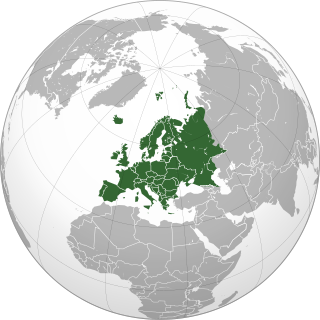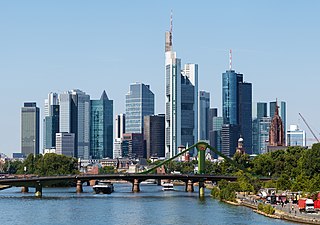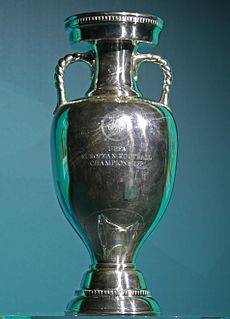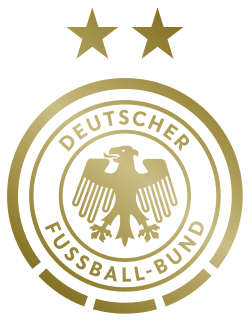
Berlin is the capital and largest city of Germany by both area and population. Its 3.7 million inhabitants make it the European Union's most populous city, according to population within city limits. One of Germany's sixteen constituent states, Berlin is surrounded by the State of Brandenburg and contiguous with Potsdam, Brandenburg's capital. Berlin's urban area, which has a population of around 4.5 million, is the second most populous urban area in Germany after the Ruhr. The Berlin-Brandenburg capital region has around 6.2 million inhabitants and is Germany's third-largest metropolitan region after the Rhine-Ruhr and Rhine-Main regions. There was an unsuccessful attempt to unify both states in 1996, and despite remaining separate, the two states cooperate on many matters to this day.

Central Europe is an area of Europe between Western Europe and Eastern Europe, based on a common historical, social and cultural identity. The Thirty Years' War between Catholicism and Protestantism was a significant shaping process in the history of Central Europe. The concept of "Central Europe" appeared in the 19th century.

Europe is a landmass, which is either considered a continent in its own right or a subcontinent of Eurasia, located entirely in the Northern Hemisphere and mostly in the Eastern Hemisphere. Comprising the westernmost peninsulas of Eurasia, it shares the continental landmass of Afro-Eurasia with both Asia and Africa. It is bordered by the Arctic Ocean to the north, the Atlantic Ocean to the west, the Mediterranean Sea to the south and Asia to the east. Europe is commonly considered to be separated from Asia by the watershed of the Ural Mountains, the Ural River, the Caspian Sea, the Greater Caucasus, the Black Sea and the waterways of the Turkish Straits. Although much of this border is over land, Europe is almost always recognised as its own continent because of its great physical size and the weight of its history and traditions. Europe can also be viewed as a subcontinent of Eurasia, and referred to as the European subcontinent.

Frankfurt, officially Frankfurt am Main, is the most populous city in the German state of Hesse. Its 763,380 inhabitants as of 31 December 2019 make it the fifth-most populous city in Germany. On the river Main, it forms a continuous conurbation with the neighbouring city of Offenbach am Main and its urban area has a population of over 2.3 million. The city is the heart of the larger Rhine-Main metropolitan region, which has a population of more than 5.6 million and is Germany's second-largest metropolitan region after the Rhine-Ruhr region. Frankfurt's central business district, the Bankenviertel, lies about 90 km (56 mi) northwest of the geographic center of the EU at Gadheim, Lower Franconia. Like France and Franconia, the city is named after the Franks. Frankfurt is the largest city in the Rhine Franconian dialect area.

Germany, officially the Federal Republic of Germany, is a country in Central Europe. It is the second most populous country in Europe after Russia, and the most populous member state of the European Union. Germany is situated between the Baltic and North seas to the north, and the Alps to the south; it covers an area of 357,022 square kilometres (137,847 sq mi), with a population of over 83 million within its 16 constituent states. Germany borders Denmark to the north, Poland and the Czech Republic to the east, Austria and Switzerland to the south, and France, Luxembourg, Belgium, and the Netherlands to the west. The nation's capital and largest city is Berlin and its financial centre is Frankfurt; the largest urban area is the Ruhr.

The German Empire, also referred to as Imperial Germany, the Kaiserreich, the Second Reich, as well as simply Germany, was the period of the German Reich from the unification of Germany in 1871 until the November Revolution in 1918, when the German Reich changed its form of government from a monarchy to a republic.

Luxembourg, officially the Grand Duchy of Luxembourg, is a landlocked country in Western Europe. It is bordered by Belgium to the west and north, Germany to the east, and France to the south. Its capital and largest city, Luxembourg, is one of the four institutional seats of the European Union and the seat of several EU agencies, notably the Court of Justice of the European Union, the highest judicial authority. Luxembourg's culture, people, and languages are highly intertwined with its French and German neighbors; while Luxembourgish is legally the only national language of the Luxembourgish people, French and German are also used in administrative and judicial matters and all three are considered administrative languages of the country.

Switzerland, officially the Swiss Confederation, is a landlocked country located at the confluence of Western, Central and Southern Europe. The country is a federal republic composed of 26 cantons, with federal authorities based in Bern. Switzerland is bordered by Italy to the south, France to the west, Germany to the north and Austria and Liechtenstein to the east. It is geographically divided among the Swiss Plateau, the Alps and the Jura, spanning a total area of 41,285 km2 (15,940 sq mi) and land area of 39,997 km2 (15,443 sq mi). Although the Alps occupy the greater part of the territory, the Swiss population of approximately 8.7 million is concentrated mostly on the plateau, where the largest cities and economic centres are, among them Zürich, Geneva and Basel. These three cities are home to several offices of international organisations such as the WTO, the WHO, the ILO, the headquarters of FIFA, the UN's second-largest office, as well as the main office of the Bank for International Settlements. The main international airports of Switzerland are also located in these cities.

World War II or the Second World War, often abbreviated as WWII or WW2, was a global war that lasted from 1939 to 1945. It involved the vast majority of the world's countries—including all of the great powers—forming two opposing military alliances: the Allies and the Axis powers. In a total war directly involving more than 100 million personnel from more than 30 countries, the major participants threw their entire economic, industrial, and scientific capabilities behind the war effort, blurring the distinction between civilian and military resources. Aircraft played a major role in the conflict, enabling the strategic bombing of population centres and the only two uses of nuclear weapons in war. World War II was by far the deadliest conflict in human history; it resulted in 70 to 85 million fatalities, a majority being civilians. Tens of millions of people died due to genocides, starvation, massacres, and disease. In the wake of the Axis defeat, Germany and Japan were occupied, and war crimes tribunals were conducted against German and Japanese leaders.

Eastern Europe is an ambiguous term that refers to the eastern portions of the European continent. There is no consistent definition of the precise area it covers, partly because the term has a wide range of geopolitical, geographical, ethnic, cultural, and socio-economic connotations. Russia, a transcontinental country with around 23 percent of its landmass situated in Eastern Europe, is the largest European country by area, spanning roughly 40 percent of Europe's total landmass; it is also the most populous European country, with the majority of its citizens residing in its European portion and consequently comprising over 15 percent of the continent's population.

Angela Dorothea Merkel is a retired German politician and scientist who served as the chancellor of Germany from 2005 to 2021. A member of the Christian Democratic Union (CDU), she previously served as leader of the Opposition from 2002 to 2005 and as Leader of the Christian Democratic Union from 2000 to 2018. Merkel was the first female chancellor of Germany. During her tenure as Chancellor, Merkel was frequently referred to as the de facto leader of the European Union (EU) and the most powerful woman in the world.
Germans are the natives or inhabitants of Germany, and sometimes more broadly any people who are of German descent or native speakers of the German language. The constitution of Germany defines a German as a German citizen. During the 19th and much of the 20th century, discussions on German identity were dominated by concepts of a common language, culture, descent and history. Today, the German language is widely seen as the primary though not exclusive criterion of German identity. Estimates on the total number of Germans in the world range from 100 to 150 million, and most of them live in Germany.

Fußball-Club Bayern München e. V., also known as FC Bayern, Bayern Munich, or simply Bayern is a German professional sports club based in Munich, Bavaria. It is best known for its professional football team, which plays in the Bundesliga, the top tier of the German football league system. Bayern is the most successful club in German football history, having won a record 32 national titles, including 10 consecutively since 2013, and 20 national cups, along with numerous European honours.

The UEFA European Football Championship, less formally the European Championship and informally the Euro, is the primary association football tournament organized by the Union of European Football Associations (UEFA). The competition is contested by UEFA members’ senior men's national teams, determining the continental champion of Europe. The competition has been held every four years since 1960, except for 2020, when it was postponed until 2021 due to the COVID-19 pandemic in Europe, but kept the name Euro 2020. Scheduled to be in the even-numbered year between FIFA World Cup tournaments, it was originally called the European Nations' Cup, changing to the current name in 1968. Since 1996, the individual events have been branded as "UEFA Euro [year]".

The Germany women's national football team represents Germany in international women's football. The team is governed by the German Football Association (DFB).

The UEFA European Women's Championship, also called the UEFA Women's Euro, held every four years, is the main competition in women's association football between national teams of the UEFA confederation. The competition is the women's equivalent of the UEFA European Championship.

The England women's national football team, also known as the Lionesses, have been governed by the Football Association (FA) since 1993, having been previously administered by the Women's Football Association (WFA). England played its first international match in November 1972 against Scotland. Although most national football teams represent a sovereign state, England is permitted by FIFA statutes, as a member of the United Kingdom's Home Nations, to maintain a national side that competes in all major tournaments, with the exception of the Women's Olympic Football Tournament.

The Holocaust, also known as the Shoah, was the genocide of European Jews during World War II. Between 1941 and 1945, Nazi Germany and its collaborators systematically murdered some six million Jews across German-occupied Europe; around two-thirds of Europe's Jewish population. The murders were carried out in pogroms and mass shootings; by a policy of extermination through labor in concentration camps; and in gas chambers and gas vans in German extermination camps, chiefly Auschwitz-Birkenau, Bełżec, Chełmno, Majdanek, Sobibór, and Treblinka in occupied Poland.

Austria, officially the Republic of Austria, is a landlocked country in the southern part of Central Europe, situated at Eastern Alps. It is a federation of nine states, one of which is the capital Vienna, the largest city and state by population. The country is bordered by Germany to the northwest, the Czech Republic to the north, Slovakia to the northeast, Hungary to the east, Slovenia and Italy to the south, and Switzerland and Liechtenstein to the west. It occupies an area of 83,879 km2 (32,386 sq mi) and has a population of 9 million people.

The 2022 UEFA European Women's Football Championship, commonly referred to as UEFA Women's Euro 2022 or simply Euro 2022, was the 13th edition of the UEFA Women's Championship, the quadrennial international football championship organised by UEFA for the women's national teams of Europe. It was the second edition since it was expanded to 16 teams. The tournament was hosted by England, and was originally scheduled to take place from 7 July to 1 August 2021. However, following the COVID-19 pandemic in Europe and subsequent postponements of the 2020 Summer Olympics and UEFA Euro 2020 to summer 2021, the tournament was rescheduled for 6 to 31 July 2022. England last hosted the tournament in 2005, the last tournament to feature eight teams.


















